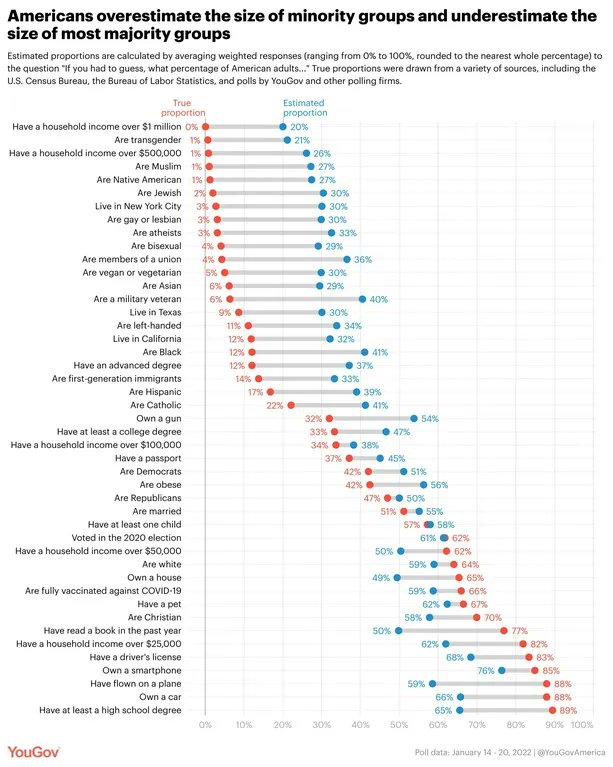I have been a consistent critic of survey “data” and polling, along with traditional measures of sentiment.
There are many reasons for this: Half of Americans do not vote, so when they respond to polls they are mucking things up. Even if they say they are going to vote, there is little reason to believe them. I don’t know who still has a landline, or who answers an unknown phone call on their cell phones, but I question if these folk represent broader America.
In the car om the way up to Grand Lake Stream and Camp Kotok, another interesting question came up on the polling/survey question:
“What do people actually know relative to what they believe they know?“
Tom Morgan of The Leading Edge raised this issue in response to a discussion of how under-utilized the phrase “I don’t know” is — especially but not exclusively in finance.
Tom shared a fascinating analysis that looked at how people conceptualize other groups, whether by economic strata, behavior, race, religion, etc.
Taylor Orth is Director of Survey Data Journalism at YouGov. They looked at what various people believed when it came to the size of different subgroups of Americans. There are two enormous takeaways from this.
The first is simply how worng people were. Two YouGov polls “Asked respondents to guess the percentage (ranging from 0% to 100%) of American adults who are members of 43 different groups, including racial and religious groups, as well as other less frequently studied groups, such as pet owners and those who are left-handed.”
American vastly overestimate the size of minority groups, including sexual minorities, the proportion of gays and lesbians (estimate: 30%, true: 3%), bisexuals (estimate: 29%, religious minorities, racial and ethnic minorities, etc.
And, people tend to underestimate majority groups.
Looking at the chart above, we can see that the average answer ranges from very wrong to laughably wrong. None of this is complex or hard to find information; its all readily available to anyone who wnats to know it, Our car fulk of economists and fund managers did pretty well answering Tom’s Q&A on what actual and estiamted numbers were.
But the seocnd aspect of this is even more fascinating. Why don’t peiople simply say I DONT KNOW when they don’t know?
We discussed whether COVID escaped from a Lab or the Wet Market. My answer: “As someone who is neither a virologist nor an intelligence operative, I do not have the tools needed to render an expert judgment about the origins of Covid. Also, I tend to disbelieve conspiracy theorists’ ability to keep most big secrets for all that long.”
Dave Nadig stated “Social media has made it mandatory for everyone to have an opinion about everything.”
We should all ask ourselves why?
Previously:
Learning to say “I Don’t Know” (September 9, 2016)
What Do You Believe? Why? (June 29, 2023)
Source:
From millionaires to Muslims, small subgroups of the population seem much larger to many Americans
by Taylor Orth
March 15, 2022



